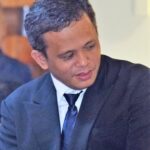
Christopher Maboloc
Today’s academics play a crucial role in the pursuit of the goals of society. The analysis of poverty, for instance, is something that noted development scholars put forward to guide policy makers, bureaucrats, and public officials. The purpose is to provide society with ideas upon which institutions can be strengthened. The well-being of the people is something that cannot just depend on arbitrary or self-interested political decisions. Government rules and policies must be scientific and knowledge-based. For this reason, the advice of consultants from the academe matters.
But academia is not insulated from politics. Teachers and professors are also influenced by ideologies and belief systems. It is for this reason that we have to be wary about what is being taught in the classroom. While it is important that academics have freedom in terms of content, it is critical to be conscious of the fact that higher education has a big moral role in building a just and humane society. Indeed, schools should be centers of freedom and the venue for dialogue and open discussions. It should not be a place where students are taught propaganda or trained in the machination of the truth.
For the longest time, top schools and academics in the capital were dictating the goals of academia, including the tradition that must be pursued when it comes to philosophy in the country. There are noteworthy people though who practiced openness and encouraged students from the South to develop their craft. We can mention Romualdo Abulad, Rainer Ibana, and Manuel Dy. Jr. With the advent of regional associations in philosophy, there are new directions and important works that now equally give significance to our scholars down South. But it’s not to pose a challenge to the professors from top schools. Rather, people here just want to celebrate the value given to their scholarly work.
An academic who frowns on the achievement of another is no more than expressing what is called crab mentality. According to Dr. Romulo Bautista, “it is not uncommon for a Filipino to generate a feeling of envy toward his peer who has gained recognition for exemplary performance or a sterling accomplishment.” Academic trolls exist, just like the ones that have proliferated on social media whose job is to attack well-meaning individuals personally. Such an attitude exhibits no more than a feeling of envy. The colonial experience of the country has affected these people psychologically so that they refuse to see the value of other people’s work for the sole reason that their own is gathering dusts.
There are outstanding academics out there who have contributed to the good of human society in terms of pursuing development goals, helping policy makers, and training leaders both in the bureaucracy and local legislative assemblies. We can mention Dr. Julio Teehankee who is helping the Bangsamoro Autonomous Region in Muslim Mindanao in the training and the strengthening of democratic political parties. In Davao City, the likes of Dr. Adrian Tamayo, formerly of the University of Mindanao and now with the Mindanao Development Authority. Dr. Rogelio Bayod is also making headways in helping leaders in Davao del Sur understand the value of administrative ethics.
Academic trolling is a useless undertaking. It does not contribute to new scholarship. It only shows how myopic one’s view is. This is called tunnel vision, which according to Dr. Sherlito Sable, constrains the way one sees things in the world. This is why the likes of Dr. Rec Eguia, who did his fellowship at Princeton University, is someone who can be considered as a real asset to his institution and society because of his effective policy recommendations in the area of “futures thinking”. Many of his former students have seen his vision as an anchor as they seek to become an integral part of society’s growth and development.
N.B. I am grateful to Sir Jun Ledesma for giving me the opportunity to be a part of The Mindanao Journal. I have been writing since High School and now that I am older, there is no greater joy than to continue to write. Philosophy is the search for truth. This job makes my work more meaningful.


